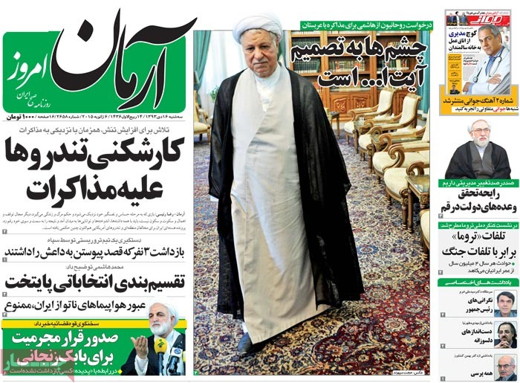On January 6, the editorial of Arman-e Emrooz, a reformist daily, was dedicated to the problems faced by President Rouhani and the reason why he has called for a referendum on major issues. The following is the translation of the editorial penned by Seyyed Ali Khorram, Ph.D., who previously represented the Islamic Republic of Iran at the UN:
In the run-up to the 2015 nuclear talks, which should produce a final result in as little as 10 weeks, President Rouhani is worried that the remaining time [before the deadline runs out] might be spent on haggling that would eventually produce no final deal.
In Iran some believe that there should be no rush in conducting the talks and that only if all conditions Iran has set are met, a deal should be struck. But a majority of people are worried about the country’s foreign relations and want tensions averted on the international stage, something that would guarantee Iran’s natural security, growth and development.
That does not necessarily mean that the majority in question is afraid of resistance. Rather it means after valuable three-decade experience, our country knows how to build on the principles of expedience, integrity and wisdom to secure its goals, and in doing so it seeks to avoid tension.
Given that the performance of the previous government created concerns on a national scale, the 11th government is basing its conduct on interaction with the rest of the world in line with preservation of national interests.
Between 1979, when the Islamic Revolution triumphed, and 2005 [when President Ahmadinejad took office] Iran’s oil revenues added up to $400 billion. In the eight years the ninth and 10th governments were in office [both led by Ahmadinejad], that figure rose to $720 billion.
Unfortunately, in that period when the country’s funds were awash with cash, the largest amount of fiat money – almost 40 percent of all money in circulation – was printed. As a result of inflation and mismanagement, Iran’s economic growth that hovered around 7 or 8 percent plunged to minus 5.8 percent.
President Rouhani’s government inherited a sluggish economic, a lethargic industry and a weak private sector which was teetering on the brink. Academic research suggests that international sanctions were to blame for only 22 percent of the woes the country’s economy was grappling with. The rest came as a direct result of government mismanagement.
One and a half years into his presidency, Mr. Rouhani is deeply worried that failure of nuclear talks might render the remaining 30 months of his presidency ineffective, with some dismissing his four years in office as useless later on.
It comes despite the fact that Dr. Rouhani’s government brings together the most effective and seasoned ministers among the last 10 governments. They can do great things for Iran’s progress if they are allowed to.
For instance, Foreign Minister [Mohammad Javad Zarif] is one of the ablest diplomats of the Islamic Republic of Iran who can help secure many of our national, regional and international goals in constructive interaction with regional and world countries. To that end though, he should be given authority to plan and implement plans within the framework of national security and interests.
Certainly, settlement of Iran’s nuclear dossier can give Dr. Zarif plenty of room to maneuver in the region and on the world stage. That is why President Rouhani is worried as to how to solve the nuclear case.
No doubt, in a win-win deal only some demands of one side and some of the other are met. Neither side can cling to their demands in their entirety. That would deny the other side their demands, as a result of which the negotiating process would fall through.
Dr. Rouhani does not have all the time in the world to spectate as developments in the country’s foreign policy in general and the nuclear case in particular unfold. He has only two and a half years left and one needs to understand that.
Of course the president is not the only one who is concerned. The economy, industry and foreign policy of a great country like Iran are at stake. They should not be held hostage by extremist attitudes and emotional fluctuations of some.
Our country needs to develop an industrial and economic strategy and make a leap forward not only to make up for the shortcomings of the past, but achieve the goals stipulated in the 2025 Outlook Plan. That would be impossible unless a foreign policy which is based on constructive interaction, as envisioned in the Outlook Plan, is employed.
With that in mind, one appreciates the president’s concerns. He has said nothing new; he has simply expressed concerns about non-implementation of the Outlook Plan that holds the key to our national growth and development.
Maybe he is worried that a small number are hiding behind what they describe as genuine concerns to waste the opportunity that the nuclear dossier has created and halt the progressive movement of the nation.
Believing that the majority of people and officials hold a different view and want peaceful nuclear technology alongside national progress, the president is telling the minority in question that in a democratic process the viewpoints of the people can be sought in a transparent referendum.
